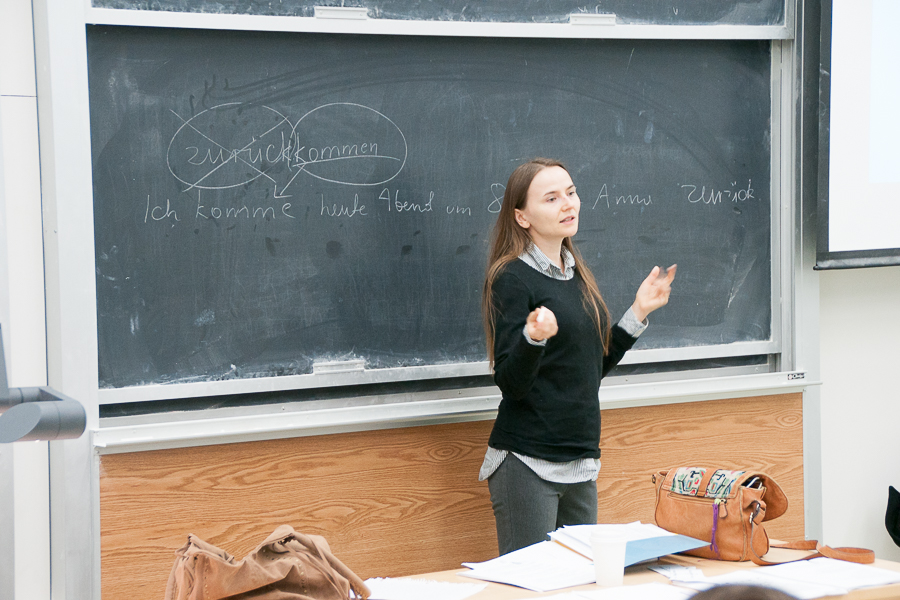
Associate instructors connect with students despite administrative challenges
Some say that the best way to show your understanding of a concept is to explain it to someone else. That might be part of the reason why, for many graduate students, part of the path to their degree involves teaching.
Many graduate students at Davis lead discussion sections and assist professors as teaching assistants. Others, known as associate instructors, teach entire classes on their own. A high volume of courses taught by graduate students is sometimes seen as a negative for a university’s reputation, but not all students necessarily prefer classes taught by professors; graduate students may in fact have certain advantages as teachers.
“[Classes taught by graduate students] feel more personal, in the sense that they are typically not as big as classes taught by professors and in my opinion, the grad students come off as more approachable than most professors,” said Anthony Garcia, a fourth-year comparative literature major.
While teaching is a requirement for certain degrees, many graduate students relish the opportunity. For some, it’s even a primary goal of their studies, and some also believe that graduate students might have advantages when it comes to interacting with students.
“I think the fact that we’re younger, and that we probably identify and sympathize more with the undergrads, tends to level [the relationship] out,” said Duane Wright, a Ph.D. student and associate instructor in sociology. “Speaking for my department only, I think because this is a research university, the professors are here mostly to do research […] whereas a lot of the grad students that end up in this program, because it’s not top-ranked, [are] not coming here expecting to end up in a research position. A lot of us, not everybody, but a lot of us want to go into teaching, so I think that orientation to research and teaching varies too, and that might affect our relationships with undergrads.”
Wright has been at Davis for seven years, but this quarter he’s teaching his first class, Sociology 1 — Introduction to Sociology. He’s happy about the opportunity, and surprised at the freedom he’s been given.
“There were absolutely no restrictions for me,” Wright said. “There was nothing like, ‘hey, these are the minimum requirements of what you should cover’, or ‘make sure you have this many papers’, or anything like that. It was just sort of like ‘hey, you’re hired, you’re teaching this’, and since then I’ve not heard anything, so I’ve been surprised at the level of autonomy. It’s pretty cool, actually, because sort of my hope has been to teach my own course, so to be able to do that already is kind of cool.”
This level of freedom is not shared by all associate instructors. In Spanish classes, for example, instructors have to follow a syllabus that is shared between all sections of a class.
“We do have less freedom, because they give us the days we have to give exams, we can’t switch any days around,” said Lani Lopez Bastidas, a Ph.D. student and associate instructor in Spanish. “We can’t say ‘I didn’t cover this in class yet’, we just need to cover it. If you don’t have time, you still need to do it somehow.”
These restrictions can make it difficult to provide a learning experience that is tailored to particular students.
“I think it does make teaching more difficult, because every class is different,” Lopez Bastidas said. “Maybe we should be given more freedom to change the syllabus, because sometime you’ll take more time explaining certain stuff, maybe it’ll take you less time to explain something else, and only the instructor knows.”
The UC Student-Workers Union exists to protect the workplace rights of graduate students, including instructors. Wright, who used to be the Davis unit chair of the union, said that the union works to make the teaching experience better for instructors.
“We advocate for things in the classroom,” Wright said. “With our recent contract we won the ability to meet and discuss issues of class size with the university, because class size does affect teaching, despite the fact that an administrator from UCLA was kind of shocked when we made that assertion when we were bargaining.”
The rights provided to instructors by the union are meant to improve instructors’ quality of life, but also to improve the quality of education for students.
“As TAs, we spend roughly half of our employed hours grading,” Wright said. “Issues of class size, issues of workload sort of impact the kind of feedback and the quality of feedback that we can give to students. If I’m grading for 80 students and there’s the same number of assignments as when I’m grading for 50, then obviously I’m gonna have to cut back on the feedback and things like that […] we’d like to give attentive, quality feedback and quality education and not just sort of push everybody through.”
Written by: Gabriel Mulcaire — features@theaggie.org








